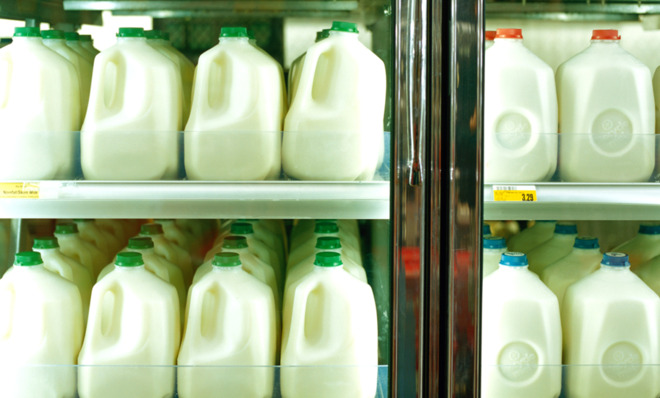Why $7-a-gallon milk may be on the horizon
If Congress doesn't renew the farm bill, consumers will feel it at the supermarket

A free daily email with the biggest news stories of the day – and the best features from TheWeek.com
You are now subscribed
Your newsletter sign-up was successful
You may not have heard about the farm bill, a sprawling piece of legislation that subsidizes much of the food consumed in this country. But if Congress doesn't get its act together and renew the legislation by the end of this year, you could start feeling the effects at the supermarket in a major way come January.
Agriculture Secretary Tom Vilsack has been making the rounds to warn consumers that we are facing a dairy cliff if lawmakers don't act. Milk prices could double because of a rule that would revert the country back to a 1949 law that would force the government to buy milk products at roughly twice the going rate.
"So you, as a [milk] producer, would have a choice of selling it to your normal purchaser at $18 or $19 a hundred weight or to USDA at $38 a hundred weight," Vilsack explained to NPR. "What do you think producers will do?"
The Week
Escape your echo chamber. Get the facts behind the news, plus analysis from multiple perspectives.

Sign up for The Week's Free Newsletters
From our morning news briefing to a weekly Good News Newsletter, get the best of The Week delivered directly to your inbox.
From our morning news briefing to a weekly Good News Newsletter, get the best of The Week delivered directly to your inbox.
They're most likely going to pick the better deal for themselves, which will have a ripple effect throughout the food industry. Everything from butter to cheese to yogurt would be directly affected. Other products, like baked goods, that have milk-based ingredients will also see a rise in pricing. Dairy prices were already inching upwards because of record droughts over the summer.
If this all sounds familiar, that's because it is. Dairy farmers faced the same uncertainty at the end of 2012 only to see Congress kick the can down the road another year.
How did we get here? The farm bill covers everything from food stamps to crop insurance to energy development to forestry programs and soil conservation. Congress is supposed to renew it periodically, and both the House and Senate have produced bills that are approaching $1 trillion in spending spread out over the next several years. But as the end of the year nears, given the unprecedented level of gridlock, it's not clear that the two houses will be able to smooth out their differences.
The dairy pricing issue is supposed to act as a catalyst to force lawmakers from both parties to work together to pass the farm bill, which was typically renewed every four years. But as we've seen with the debt ceiling debates, Congress is willing to flirt with the idea of going off the fiscal cliff, so why should the dairy cliff be any different?
A free daily email with the biggest news stories of the day – and the best features from TheWeek.com
The main sticking point is food stamps, which account for 80 percent of the bill's total expenditures. House Republicans want to slash $39 billion over the next 10 years from the Supplemental Nutrition Assistance Program (their plan would make it harder to qualify for benefits) while Democrats in the Senate are only willing to cut $4 billion by making administrative changes. Any decrease would severely undermine the program's ability to deliver services to needy Americans. One in seven — about 47 million people — depend on SNAP to buy food.
Food stamps already took a hit in November when $5 billion in stimulus funding expired, leaving those depending on the program with about a five percent decrease in benefits. During the recession the number of people enrolled in SNAP increased dramatically, and just under half of those recipients are children.
Laura Colarusso is a freelance journalist based in Boston. She has previously written for Newsweek, The Boston Globe, the Washington Monthly and The Daily Beast.
-
 The billionaires’ wealth tax: a catastrophe for California?
The billionaires’ wealth tax: a catastrophe for California?Talking Point Peter Thiel and Larry Page preparing to change state residency
-
 Bari Weiss’ ‘60 Minutes’ scandal is about more than one report
Bari Weiss’ ‘60 Minutes’ scandal is about more than one reportIN THE SPOTLIGHT By blocking an approved segment on a controversial prison holding US deportees in El Salvador, the editor-in-chief of CBS News has become the main story
-
 Has Zohran Mamdani shown the Democrats how to win again?
Has Zohran Mamdani shown the Democrats how to win again?Today’s Big Question New York City mayoral election touted as victory for left-wing populists but moderate centrist wins elsewhere present more complex path for Democratic Party
-
 Millions turn out for anti-Trump ‘No Kings’ rallies
Millions turn out for anti-Trump ‘No Kings’ ralliesSpeed Read An estimated 7 million people participated, 2 million more than at the first ‘No Kings’ protest in June
-
 Ghislaine Maxwell: angling for a Trump pardon
Ghislaine Maxwell: angling for a Trump pardonTalking Point Convicted sex trafficker's testimony could shed new light on president's links to Jeffrey Epstein
-
 The last words and final moments of 40 presidents
The last words and final moments of 40 presidentsThe Explainer Some are eloquent quotes worthy of the holders of the highest office in the nation, and others... aren't
-
 The JFK files: the truth at last?
The JFK files: the truth at last?In The Spotlight More than 64,000 previously classified documents relating the 1963 assassination of John F. Kennedy have been released by the Trump administration
-
 'Seriously, not literally': how should the world take Donald Trump?
'Seriously, not literally': how should the world take Donald Trump?Today's big question White House rhetoric and reality look likely to become increasingly blurred


